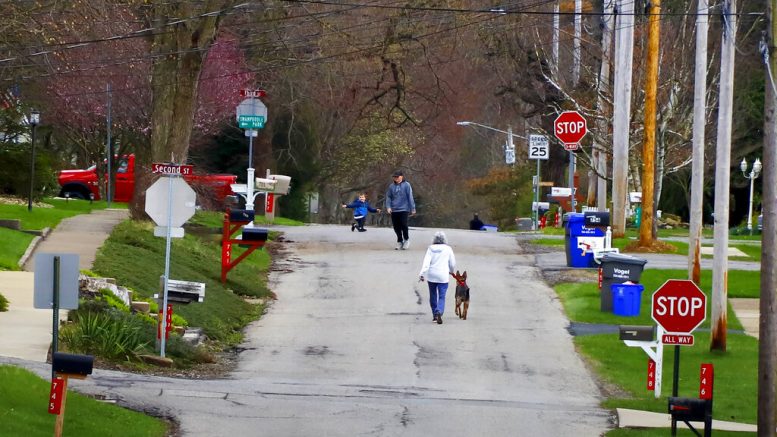The Associated Press
All Pennsylvania residents must stay home as much as possible over the coming month to help slow the spread of the coronavirus, Gov. Tom Wolf said Wednesday as he expanded the footprint of the quarantine to include the entire state.
The Democratic governor added 34 counties to his existing stay-at-home order, meaning that residents of all 67 of Pennsylvania’s counties are now asked to stay put unless they have a legitimate reason to go out.
With coronavirus infections continuing to rise dramatically in the state — nearly 1,000 new confirmed cases were reported Wednesday — Wolf pleaded with Pennsylvania’s 12.8 million residents to comply.
“Some of you might think that a month is too long to go without seeing your friends or family. But if we don’t do everything we can to slow the spread of COVID-19, there are some people who you will never see again,” Wolf said at a video news conference. He warned that thousands could die without strict adherence to social distancing.
Pennsylvania had been an outlier until now. Wolf was the last Northeastern governor to issue a statewide order to stay at home. His counterparts in the border states of Maryland, Delaware, West Virginia and Ohio also enacted earlier statewide orders.
The expanded order took effect at 8 p.m. Wednesday and last through at least April 30.
Residents may leave their homes for a number of reasons that include working at a business that’s still open, going to the grocery store or pharmacy, visiting a doctor, caring for a relative or heading outside to exercise. Police will continue to focus on informing residents of the order rather than on enforcement, according to the governor’s office.
Separately, schools and nonessential businesses are closed until further notice.
In other coronavirus developments Wednesday:
LIQUOR SALES RESUME
Pennsylvania’s system of state-owned liquor stores, closed because of the COVID-19 outbreak, resumed limited online sales Wednesday.
The state’s website is accepting a “controlled number” of daily orders but plans to expand as it develops more capacity. Buyers will be limited to six bottles per order from a list of about 1,000 wine and spirits products, the Pennsylvania Liquor Control Board announced.
Liquor board chairman Tim Holden said he expects the site to be overwhelmed with traffic initially and requested patience.
The state has no plans to reopen its brick-and-mortar liquor stores during the pandemic.
WOLF PLEDGES UNEMPLOYMENT FIX
With Pennsylvania approaching 1 million claims for unemployment compensation, Wolf acknowledged the system hasn’t been able to keep up with record demand and promised a fix.
“We’re doing everything we can to increase our capacity to respond quickly,” the governor said Wednesday. “We have been overwhelmed by the new claims, but we are tracking this every hour and we are doing everything we can to make sure that we’re turning this around as quickly and efficiently as possible.”
Pennsylvania received a record 939,000 claims from March 15 through Tuesday as companies shut down and laid off workers. People trying to file a claim have reported jammed phone lines and interminable hold times.
STATE POLICE REDUCE CONTACT
Pennsylvania State Police will no longer respond in person to some types of calls as the agency tries to limit troopers’ contact with the public, officials announced.
Calls for lost and found, littering, identity theft and general requests to speak to a trooper are among the types of calls that will now be resolved with “limited or no-scene response,” state police said in a news release. The new policy took effect Wednesday and will be in place until further notice.
State police said troopers will continue to respond to emergencies.
CASES
The Pennsylvania Department of Health reported more than 960 additional people tested positive for the new virus, bringing the total number to over 5,800. There were 11 new deaths for a statewide toll of 74.
For most people, the virus causes mild or moderate symptoms that clear up in a couple of weeks. Older adults and people with existing health problems are at higher risk of more severe illness, including pneumonia, or death.
INMATE CONTRACTS VIRUS
A second inmate at a state prison outside Philadelphia has contracted COVID-19, Secretary of Corrections John Wetzel said Wednesday.
The inmate is at the State Correctional Institution at Phoenix in Montgomery County, where another inmate’s positive test prompted the Department of Corrections to impose a systemwide quarantine. The quarantine means that inmates are largely confined to their cells.
Four staffers in the state prison system have also become infected, said Wetzel, who declined to reveal where they work.
He said the corrections department is trying to thin the prison population in an effort to keep the virus from spreading but acknowledged that more needs to be done. The inmate count was reduced by 574 in March out of a statewide population of about 45,000.
Wetzel said the department has identified 12,000 inmates that are considered at higher risk of serious illness from COVID-19.
SHORT-TERM RENTALS
The Wolf administration added short-term rental properties to its list of businesses ordered to shut down.
Wolf said he acted on complaints from state lawmakers in the Pocono Mountains, who said short-term vacation rentals had been trying to entice travelers from virus hotspots New Jersey and New York.
Wolf’s order closing businesses that are not considered “life sustaining” had exempted all traveler accommodations, including hotels and motels, but language was added this week to prohibit short-term rentals.
JAIL RELEASE
The Allegheny County jail said it released more than 600 inmates as part of its pandemic response.
From March 16 through Tuesday afternoon, the jail released 622 inmates, part of a collaboration with judges, prosecutors and others in the court system to thin the population. The effort has resulted in a 25% decline in the jail’s inmate count, to more than 1,800.
The American Civil Liberties Union of Pennsylvania has asked the state Supreme Court to order the release of some inmates from county jails statewide.





























